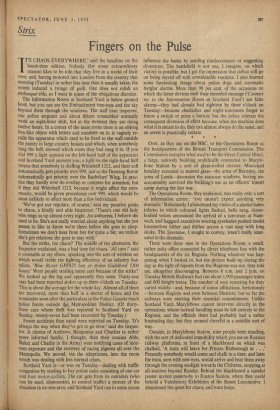Strix
I ' T'S CHAOS EVERYWHERE,' said the headline on the lunch-time edition. Nobody (for some extraordinary reason) likes to be told that they live in a world of their own; and, having motored into London from the country that morning (Tuesday) in rather less time than it usually takes, the words induced a twinge of guilt. One does not relish an embusque role, so I went in quest of the ubiquitous disorder. The Information Room at Scotland Yard is below ground level, but you can see the Embankment tree-tops and the sky beyond them through the windows. The staff (one inspector, one police sergeant and about fifteen constables) normally work an eight-hour shift, but at the moment they are doing twelve hours. In a corner of the main room there is an oblong box-like object with letters and numbers on it; it vaguely re- calls the apparatus which used to be fixed to the wall outside the pantry in large country houses and which, when somebody rang the bell, showed which room they had rung it in. If you dial 999 a light appears on the left-hand half, of the apparatus and Scotland Yard answers you; a light on the right-hand half means that somebody is dialling Whitehall 1212, and their call automatically gets priority over 999, just as the Drawing Room automatically got priority over the Bachelors' Wing. In prac- tice they hardly ever do overlap or compete for attention; but if they did Whitehall 1212, because it might affect the com- munity,:would be given precedence over 999, which would be most unlikely to affect more than a few individuals.
'We've got our regulars, of course,' said my putative guide to chaos, a kindly and able Inspector. 'There's one old lady influence the battle by \sending reinforcements or suggesting diversions. The battlefield is not one, I imagine, on which victory is possible; but I got the impression that defeat will go on being staved off with considerable resource. I also learned some fascinating things about police dogs and automatic burglar alarms. More than 90 per cent. of the occasions on which the latter devices emit their recorded message ('Connect me to the Information Room at Scotland Yard') are false alarms—they had already had eighteen by three o'clock on Tuesday—because charladies and night-watchmen forget to throw a switch or press a button; but the police tolerate the consequent diversion of effort because, when the machine does what it is meant to do, they can almost always do the same, and an arrest is practically certain. * * * Over, as they say on the BBC, to the Operations Room at the headquarters of the British Transport Commission. The Commission occupies what used to be the Great Central Hotel, a large, unlovely building, umbilically connected to Maryle- bone Station by a sort of glass-roofed cloister. Municipal heraldry executed in stained glass—the arms of Barnsley, the arms of Leeds—decorates the staircase windows, having un- accountably survived the building's use as an officers' transit camp during the last war.
The Operations Room, they explained, was really only a sort of information centre : 'you mustn't expect anything very dramatic.' Reluctantly I abandoned my vision of a smoke-laden inferno in which coloured lights flashed, bells rang, disem- bodied voices announced the arrival of a jute-train at Nant- wich, and haggard executives wearing eyeshades pushed model locomotives hither and thither across a vast map with long sticks. The Spectator, I sought to convey, wasn't really inter- ested in the dramatic.


































 Previous page
Previous page